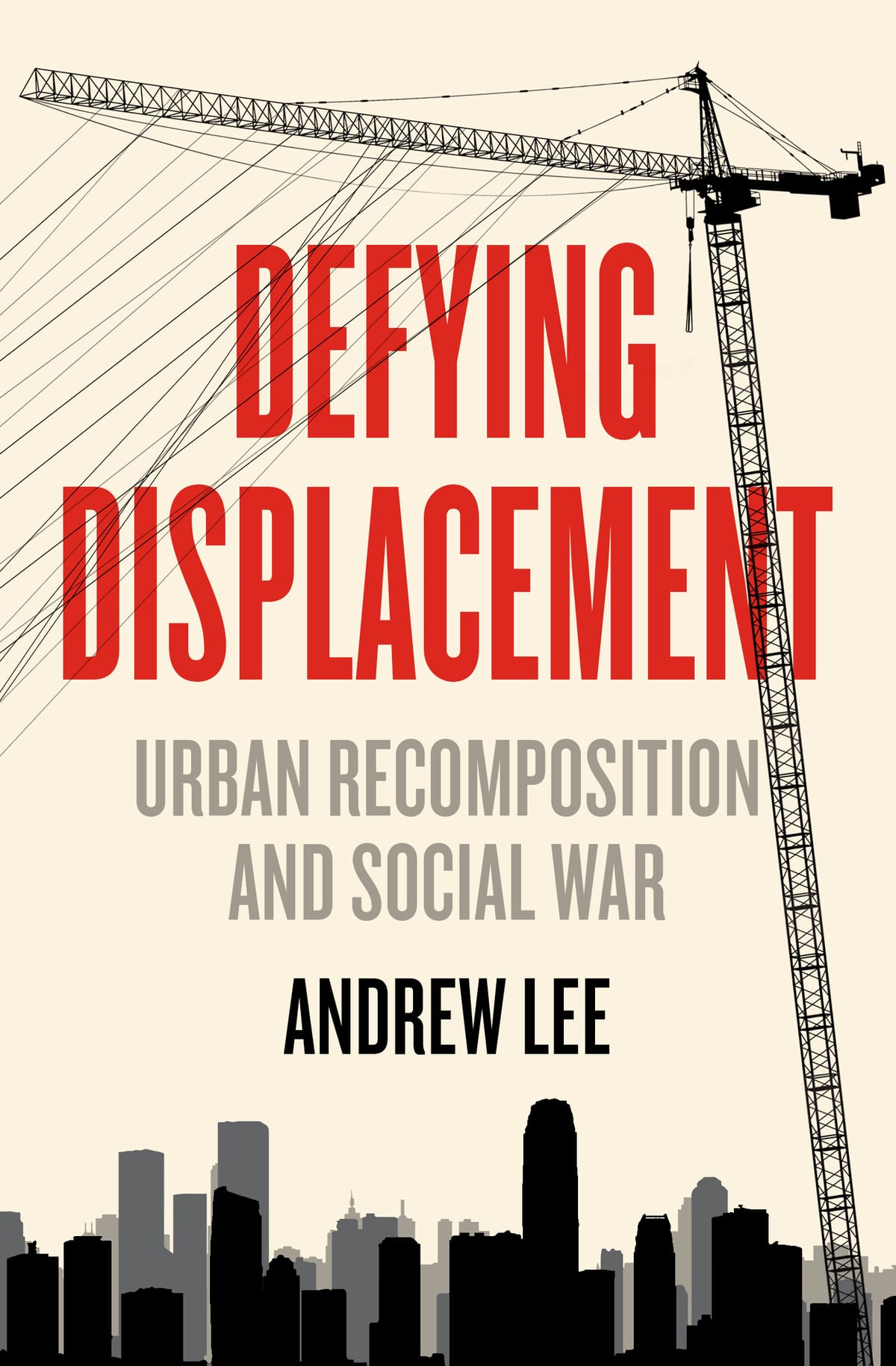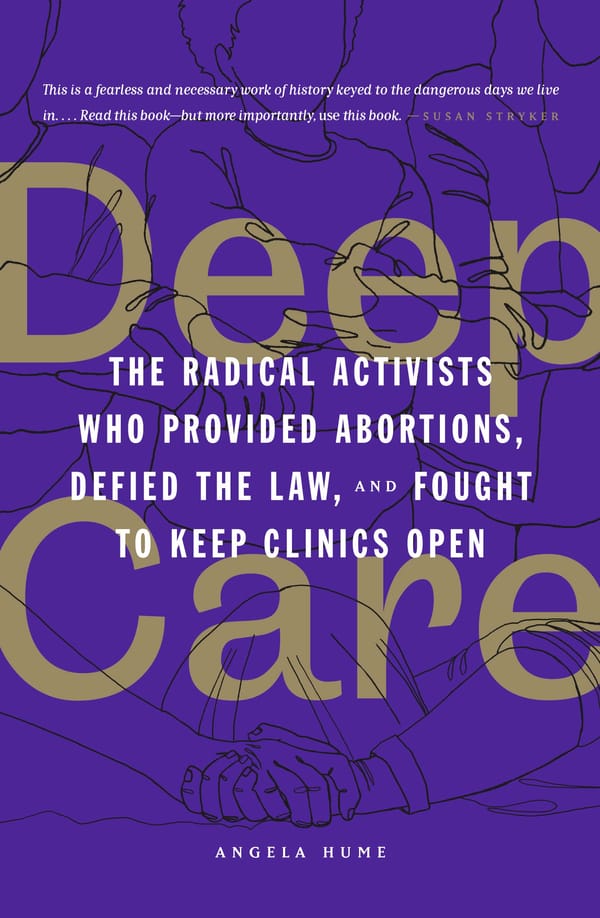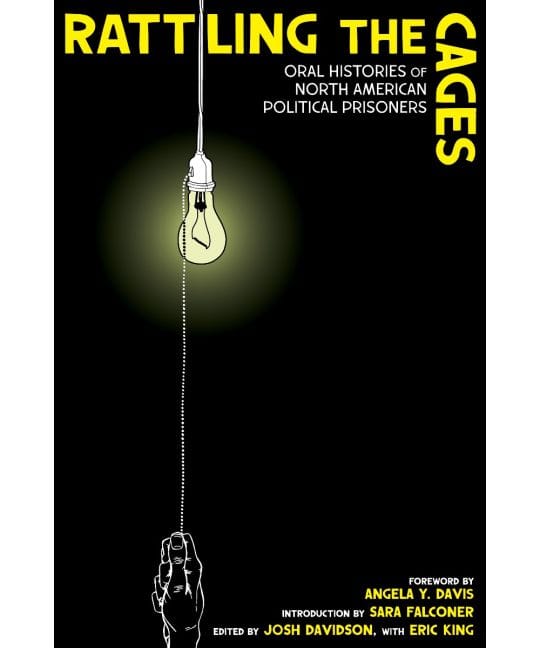Gentrification, State Collusion and Socioeconomic Warfare
“We’re fighting a huge economic system which is more powerful than any city government.”

The following is an excerpt from Defying Displacement: Urban Recomposition and Social War by Andrew Lee (AK Press and the Institute for Anarchist Studies, 2024).
Forcing Displacement
“show me / an artifact of city which has the power / as flesh has power, as spirit of man / has power”
— Diane di Prima
Gentrification is sometimes talked about as if it were an automatic process outside of human control, a mysterious, powerful, impersonal force large enough to thwart the best intentions and most concerted efforts of the politicians and CEOs doing everything in their power to thwart it. There are always more studies to fund and interventions to unveil as if economic displacement were a catastrophic act of nature, an inevitable force “above politics,” which hapless, well-meaning leaders—including the richest men in human history—might only respond to as best they can.
“Google and San Jose hope to make the city more affordable for working- and middle-class families, but they make matters worse,” reports an article in The Atlantic. “My job is to help New Yorkers live in New York. It’s not to clear the place out and see it fully gentrified,” said former Sandinista fellow-traveler Bill de Blasio while campaigning to be mayor of New York. After the election, he would restore a program granting tax exemptions to new private developments for a generation after their construction, so long as a minority of their units were initially “affordable”—though there was no prohibition on raising rents immediately thereafter. A granular analysis of the “affordable housing” rezoning of SoHo found “the scheme is structured not only to allow but actually encourage and incentivize construction that contains no affordable housing.”
“Go back to Iowa, you go back to Ohio. New York City belongs to the people that were here and made New York City what it is,” thundered former police officer Eric Adams to the applause of a largely Black audience before he was elected as de Blasio’s successor. Once in office, he would walk back promises to fund affordable housing production while crowing about advancing the “dignity” of unhoused New Yorkers through encampment sweeps.
In 2018, Austin mayor Steve Adler’s Anti-Displacement Task Force unveiled recommendations for stopping the “epidemic” of displacement, “the most serious threat we as a city face today.” One month later, Adler would appear at a press conference unveiling Apple’s plans to build a huge new tech campus within city limits. Despite the task force’s suggestions, no affordable housing would be allowed on the fifty acres of open space that would surround the campus as an environmental preserve. “Austin and Apple share a creative spark,” said Adler, “a commitment to getting things done.”
Rather than an unforeseen catastrophe, gentrification is “very much an economic and social plan where the state collaborates with private investors, capitalists, to exploit areas in a particular city or region where there’s ‘room to grow,’” in the words of San José’s Daniel González. When residents are displaced to fatten capitalists’ pockets, the state accompanies them every step of the way.
It is, in the last instance, the state’s armed wing, the police, who enforce evictions and stand between empty houses and houseless people. But this is far from the extent of the state’s active construction of mass displacement. In the wake of deindustrialization, it was federal “anti-poverty” programs that funded “urban renewal” initiatives against previously underinvested, redlined Black neighborhoods that had been excluded from New Deal-era government lending programs. Current city tax structures push out longtime working-class homeowners in a country where a family home is the main mechanism for inter-generational wealth transfer: as the assessed value of homes in gentrifying neighborhoods increases, the tax burden on existing residents does, too. Austin municipal property taxes more than doubled from 2006 to 2015. Poor elders were the most likely to miss tax payments as residents were pushed out of desirable neighborhoods. In 1980, Alda Ballard spent $20,000 for a Philadelphia home now worth over $420,000. Philadelphia only offers relief from property taxes for ten years for new or refurbished developments, those generally marketed towards more affluent newcomers. “They are being incentivized to replace us,” says a local pharmacist. “They grin and say hi, because they have been promised that we will be gone soon.”
And a decade and a half before the Google development was announced, the San José city government declared a third of the land within its borders blighted, allowing properties to be seized and handed off to private companies for redevelopment.
A limited focus on the individual gentrifier as the agent of displacement not only obscures the economic and racial structures that incentivize the process, but also conceals the fact that, as the authors of a study of gentrification in the global South put it, “the key actor in planetary gentrification is the state—neoliberal or authoritarian.” Whether yuppies reaping tax abatements for Philadelphia condos or tourists strolling the “cleansed” streets of Sao Paolo, the gentrifier inhabits an environment intentionally constructed by the state to attract her.
“When Google announced plans to move into San José, no everyday person I would talk to wouldn’t agree that Google moving in would be devastating for the city,” says Vasudha, who organized against the development as a student. But for local state elites, the San José Google development was a fait accompli from the moment it was dreamed up. Turning down a massive tech campus with its accompanying spending power and tax revenue would, for the political class, be unthinkable. The task wasn’t to drum up support, much less come to agreement, but to ensure that potential resistance to the plan would be stillborn.
In city after city, local elites choose to approve corporate mega-projects against the interests of their current constituents. The city-as-government plans the economic development of the city-as-territory at the expense of the city-as-community. To appreciate the violence that this linguistic slippage conceals, we might consider that in antiquity, the city and the people were one and the same. The Greek word polis referred both to the city and its citizens. To speak of removing the citizens from the city would be a contradiction in terms, an unspeakable act in the most literal sense. To commit such an act against a people because of the prosperity of those who will replace them is an abomination. It is killing the city for the benefit of its owners. A municipality’s elected representatives are free to act as the executioners of their constituencies because it is the nature of displacement that many will be replaced with wealthier, whiter constituents before the next election cycle.
“I personally feel like electoral politics is a way of placating people. City councils have donors and they’re worried about re-election, so if something’s unpopular with donors, even if it’s popular with their own community, they’re not going to vote on it,” says Jenna from Southern California. “There’s a lot of structural things in place that make electoral politics really hard to engage in, and a lot of folks in the community can’t vote.”
Politicians have an incentive to court gentrifying industries regardless of their ideological commitments or community ties. A working-class kid from the projects born to immigrant parents, Ed Lee became a civil rights lawyer for San Francisco’s Asian Law Caucus. He represented two hundred tenants during Chinatown’s first rent strike and fought the demolition of working-class housing for redevelopment. Upon taking office as mayor in 2011, he briefly called for a private developer to “substantially fulfill” affordable housing goals as a condition of project approval. By 2015, his administration’s proposed “Affordable Housing Density Bonus Program” would have allowed for new market-rate units on tens of thousands of sites across the city: “gentrification on steroids.” Lee’s signature homelessness policy was bussing the unhoused out of the city. His largest supporter ended up being tech investor Ron Conway. The former champion of tenants’ rights oversaw the largest expansion of wealth inequality in the city’s history.
In the words of the Affordable Housing Network’s Sandy Perry, “We’re fighting a huge economic system which is more powerful than any city government.” It is not that municipal governments jealously court redevelopment merely because of the moral or political failings of those in power. A city council composed of saints would still find securing a new Google or Apple campus politically irresistible. It would be political suicide to scorn the industry that’s the difference between post-industrial Detroit and post-industrial Silicon Valley.
“The city is very pro-development, although a majority of the people sitting on our city council are pretty progressive. The city in general is very heavy on development, including luxury development,” reports David Carbajal Torres from Santa Ana. “For the past decade, it has really focused on redeveloping areas in our city that are historically Latinx, historically underserved.”
The objective of corporate and state elites is less manufacturing consent among those about to be priced out than to repress any popular resistance that might scare investors and prospective new residents. This is doubly true when those targeted for removal are oppressed communities already viewed not as constituents but as targets for the racial violence of the capitalist state. When the state’s strategic objective is preventing the emergence of oppositional resistance among suspect subject populations, speaking of a lack of democracy, decorum, or due diligence on the part of politicians and bureaucrats misses the point entirely. The governing logic of contemporary urban mass displacement is counterinsurgency.




